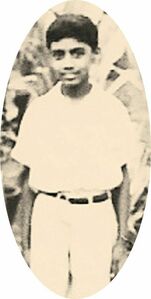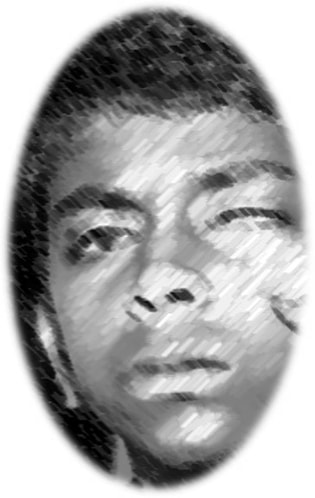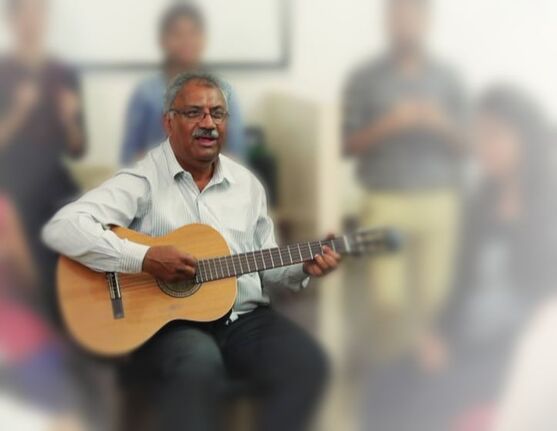|
"I want to be someone capable of seeing the unseen faces, of seeing those who do not seek fame or glory, who silently fulfil the role life has given them. I want to be able to do this because the most important things, those that shape our existence, are precisely the ones that never show their face." Paul Coelho Like the flowing river Meet Gus in the first of a series featuring "unseen faces".  1963. Gus, 12, has just won the full house in Housie (Bingo) in his school. The prizes had been on display even before the game started. He is eager to receive the first prize from the school’s Summer Holiday Camp Manager. It is a beautiful statue of Our Lady. He can’t stop smiling when he accepts it. Then, in a moment, his world changed. “You take this,” the Camp Manager took away the statue and handed him a smaller bust, which was chipped. The boy who had won the second prize happened to be from an affluent family and deserved the better prize, a shocked Gus was told. Surely, it would make no difference to Gus, right? Gus felt angry and sad. An inferior prize, just because he was poor? He was already waging another battle at home. Because he was standing up to an alcoholic and trying to protect his mother and four little siblings. He felt responsible for them. Why was the world so unfair, Gus wondered. He just had to grow up and find a job, any job, that would give him money so that he could look after his family. 2019. Gus is overseeing another game of Housie with a group of girls and boys, all around the age of 16. For every boy and girl, it is an effort and an achievement to face a group of people and read out the numbers by turn. Gus gently prods a boy to make eye contact while announcing a number. One girl who has problems with her sight and hearing (“I want to be an accountant”) is helped by her neighbour. There are no statues; the winners get mints and chocolates. The real prize is the time they get to spend together, to work together and to enjoy themselves. They are all equal. At every opportunity, Gus slips in a tip, a piece of advice. Through games, dance and music they are picking up social skills. And, for them, something that is less difficult to spell than to acquire —confidence. When Gus steps out of the room, I play the devil. “Gus sir is saying do this and don’t do that. Do you think he is being practical? The outside world is so different. And surely money is important.” “No! Gus sir is right. He is telling us the right things.” That’s the girl who would be an accountant one day. “I had so much fear. Now I think I can do something.” “He listens to us,” avers another. He is now less conscious of his appearance. And a lot less angry with the world than when he had joined. “Yes, money is important,” a boy patiently explains to me. “But it is no more important than petrol. Sure, you need it to go from here to there. That is not the whole journey, though.” Some of them have learnt to play the guitar “somewhat”, thanks to Gus, they tell me. They were scheduled to have a dance session, but a neighbour was not happy with the noise of the ghunghroos. So, they have to figure out a new location for dance sessions. And all of them have been with Gus sir for barely a month. Au(Gus)tine Mendonca is, by qualification, an engineer. However, he considers himself a “people person”. “I was working in Bahrain for nearly 15 years. Initially, the local boss would keep calling me ‘Hey Indian’. It was infuriating. Then I realized they probably found both “Augustine” and “Mendonca” a mouthful. Next time he called me ‘Indian’, I told him he could call me Gus. And the name stuck.” Gus says he has “corrected” his career. “I took up engineering because I was desperate to qualify and start earning. If I could go back in time, I would probably take up HR. Not the admin-kind of HR, but the people-kind. Understand them, work with them, motivate them. That kind of HR.” The Bahrain stint helped Gus clear all the family debts. When he returned to India, he worked with various companies including an engineering company and a hospital. The engineering company once faced a drastic fall in output during the night shift. Gus spent time with the workers and figured out the reason. As a cost-cutting measure, a supervisor had withdrawn the mosquito repellent they used to give all employees. Now, instead of manning the machines, they were busy slapping the mosquitoes. Gus got the repellent back and, sure enough, productivity was back on track. The famous but abrasive chief of the hospital was angry. Everyone feared his morning rounds. “Why do you have your rounds immediately after mine?” he once asked Gus. “So that I can undo the damage you do,” Gus replied. Gus had a collection of doctor jokes, which he used liberally during his rounds. Those served to soothe frayed nerves and restore morale. “What nonsense!” the chief roared. “Tell me one of those jokes right now.” Gus did. And the chief burst into laughter.  Apart from doing the jobs that came his way after the Bahrain-stint, Gus also felt a pull to seek out the less privileged and help them. He worked at a night school and assisted a couple of NGOs. Once at the night school, he saw a boy sitting outside on the steps. Gus asked him why he was not in class. The boy had been thrown out because he had beaten up another boy. His language was harsh, almost abusive. Gus sat next to him. “There is so much age difference between us. Do you think we can have a more polite conversation?” The boy looked at him. “You are the first person who wants to talk to me.” And the story came out. The boy had lost vision in one eye in a playground accident. Ever since, he was called “blind” by other children. He was constantly ridiculed and forever the butt of cruel jokes. The teachers also wrote him off and joined the students in abusing him. That day, he opened his notebook to find that someone had written an abuse targeted at his mother. The violence followed and the teacher was prompt in expelling the boy from class. Gus summoned a meeting of the teachers and asked for an explanation. “That boy is impossible; he must be removed from the school.” Gus interrupted the chorus. “That boy will not be removed,” he was categorical. Then he proceeded to find out exactly what the teachers knew about the boy. Had they bothered to find out anything at all? A few days later, Gus ran into the boy again. He was all smiles. “I am back in class. They are talking to me now. They are nice.” “Sometimes, all they need is a hand, a chance. Just what I needed once upon a time," Gus said. “It is so easy to brand someone as bad or impossible. Just dig a little deeper. I did once. And behind the alcoholic I found a jovial, talented and loving man. If you must, hate the problem, not the victim. “When the boys and girls come and tell me they are eager to get any job so that they can start earning, I understand. But I don’t want them to make the same mistake that I did. So, I talk to them individually, find out what they are interested in and try to guide them accordingly. “A few companies are very happy to employ these boys and girls. They say they like the attitude and the willingness to work hard. That is so nice of them. “Some of those I had the opportunity to help are doing so well now. They stay in touch. They come and meet me at times. “Of course, in some cases, I failed. They started earning and money derailed their lives. Bad company, expensive addictions, and the wrong notion that they had ‘arrived’. “In every case, I begin with a positive intention, whatever the outcome. Unless I am confident of them, how can they be confident of themselves?” Says Yogesh Kapse, a social development professional, who has been working closely with Gus, “It becomes easier for us to support a project when we know that there is someone as passionate and as committed as Gus mentoring it." Apart from imparting “employable skills” to the youth, Gus shares art and poetry with all. Today is song time. He picks up the guitar and the boys and girls join him in singing their “special” song: I am special You are special We are special, you see Black or white Short or tall Fat or thin All of us are special, you see. Augustine Mendonca is currently associated with Parineeti Projects.
12 Comments
Jigisha
16/5/2019 11:40:03 pm
Yet another thought provoking piece of writing. The title itself is a master-piece...those who don't count...my god...
Reply
Nagesh Simha
17/5/2019 06:00:53 am
Awesome. Brings out the character of a blessed and enlightened soul. Congratulations
Reply
Ravishankar
17/5/2019 02:07:37 pm
Beautiful . Moving and touches he heart. If only we can see the person beyond the personality ..
Reply
Prem
17/5/2019 02:28:55 pm
Nice article on Gus! A gem of a person and I'm blessed to know him.
Reply
Hiraman
17/5/2019 02:58:19 pm
You write so effortlessly Vijay. It's a pleasure reading your pieces.i look forward to more. Just being greedy!
Reply
Eliza Nelson
26/5/2019 12:40:22 pm
I’m blessed to have Gus as my brother! His persona is so unique that he can relate to anyone from a baby to a ninety year old!
Reply
Somesh
30/7/2019 01:25:56 am
Very well written, Vijaykumar. Kudos to you for presenting to the world this noble soul, our beloved Gus Sir through such a mesmerizing article. I have known Gus Sir for a few years now and feel blessed to have been able to contribute a tad bit to his great work.
Reply
14/8/2020 01:38:55 pm
Well written blog. Gus, your spirit is inspiring. Keep up the good work . Hope to see you soon.
Reply
Gus Mendonca
14/8/2020 03:35:26 pm
Thanks for reaching out to me. I eagerly look forward to visiting the Sapna Ranch and interacting with you as early as possible. Will keep in touch with you by mobile phone or e-mail.
Reply
Leave a Reply. |
AuthorVijayakumar Kotteri Categories
All
Archives
July 2024
|




 RSS Feed
RSS Feed

